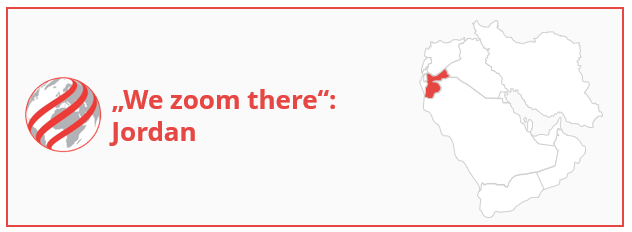Briefing on the current situation in Jordan with Ambassador Birgitta Siefker-Eberle
May 28, 2020
After zooming into the exciting region around Israel, we virtually travelled further into the neighboring country – across the Dead Sea to a land of desert: Jordan.
In our video conference, the German ambassador in Amman, Birgitta Siefker-Eberle, reported on the current situation in Jordan and we experienced live under what strict conditions the country is trying to contain the Corona virus. Our video conference ran for exactly one hour and fifteen minutes. Afterwards, Ms Siefker-Eberle and her driver had to be home in time before the sirens sounded, as there is a strict curfew from 6 pm to 7 am.
“The streets are empty” – The Corona situation
Since the beginning of the pandemic, Jordan has taken tough measures against the spread of the virus. These include the closure of external borders and airports as well as strict curfews at night and at weekends. Face masks and gloves must be worn in public places and people are only allowed to go shopping on foot or by car. Only people between the age of 16 to 60 are allowed to move in public spaces and schools remain closed until the end of the school year. Anyone who does not comply with the regulations must pay a heavy fine.
According to Siefker-Eberle, the strict measures are having an effect, and Jordan has only a small number of corona cases. Although the number of tests is low and the amount of unreported cases can be estimated much higher, Jordan is still in a good position in international comparison. In addition, the previous cases of infection can be traced back well and there have so far only been cases in which the virus was imported from abroad.
To minimize the corona crisis, Jordanian policy has established three phases: (i) containing the virus, (ii) adopting social measures and (iii) promoting social and economic recovery.
“Making a strength out of the crisis” – Jordan’s economic and political situation
The World Bank estimates that due to the corona pandemic, Jordan will this year experience its worst economic recession since 1988. Ms Siefker-Eberle expressed her concern about this, particularly because the country has begun to introduce economic measures that are unusual for the Arab region. The introduced income tax law and the unification of customs duties had just begun to show their effects, but would now be overshadowed by current events. Jordan faces two challenges that could be a dangerous mix for the country. On the one hand, the lockdown worsens the economic situation of its citizens and, on the other hand, the planned annexation of Israel in the West Bank provokes an uprising by the Jordanian population, most of whom are Palestinians.
However, according to Siefker-Eberle, the Jordanian government is trying to draw new strengths from the crisis. On the economic side, Jordan wants to expand its IT sector, produce and export medical protective clothing and boost medical tourism. On the political side, efforts are being made to convince Israel of a two-state solution, as unrest in Jordan also poses a threat to the neighboring country. This is particularly emphasized by Israelis and Jordanians, who are active at all levels of the security sector and are working together very well, said Siefker-Eberle.
Bilateral relations with Germany and prospects for the future
Jordan is one of the world’s most arid countries. Nevertheless, water is extremely cheap and has hardly any value, explains Siefker-Eberle. Germany is one of Jordan’s most important partners in this area and is supporting the country in setting up water authorities and water supply infrastructure. Other areas in which Germany is actively involved are vocational training and job creation. According to Siefker-Eberle, young Jordanians are the country’s greatest resource. They have an unemployment rate of 30 percent, even though they are very well educated and can be employed primarily in the IT sector.
Jordan is a country that is economically weak and has only few raw materials. Nevertheless, Ms Siefker-Eberle sees a lot of potential that is not yet being exploited. Looking to the future, especially the areas of renewable energies, film productions/film sets, tourism, medical tourism and the export of Dead Sea products could be expanded.


